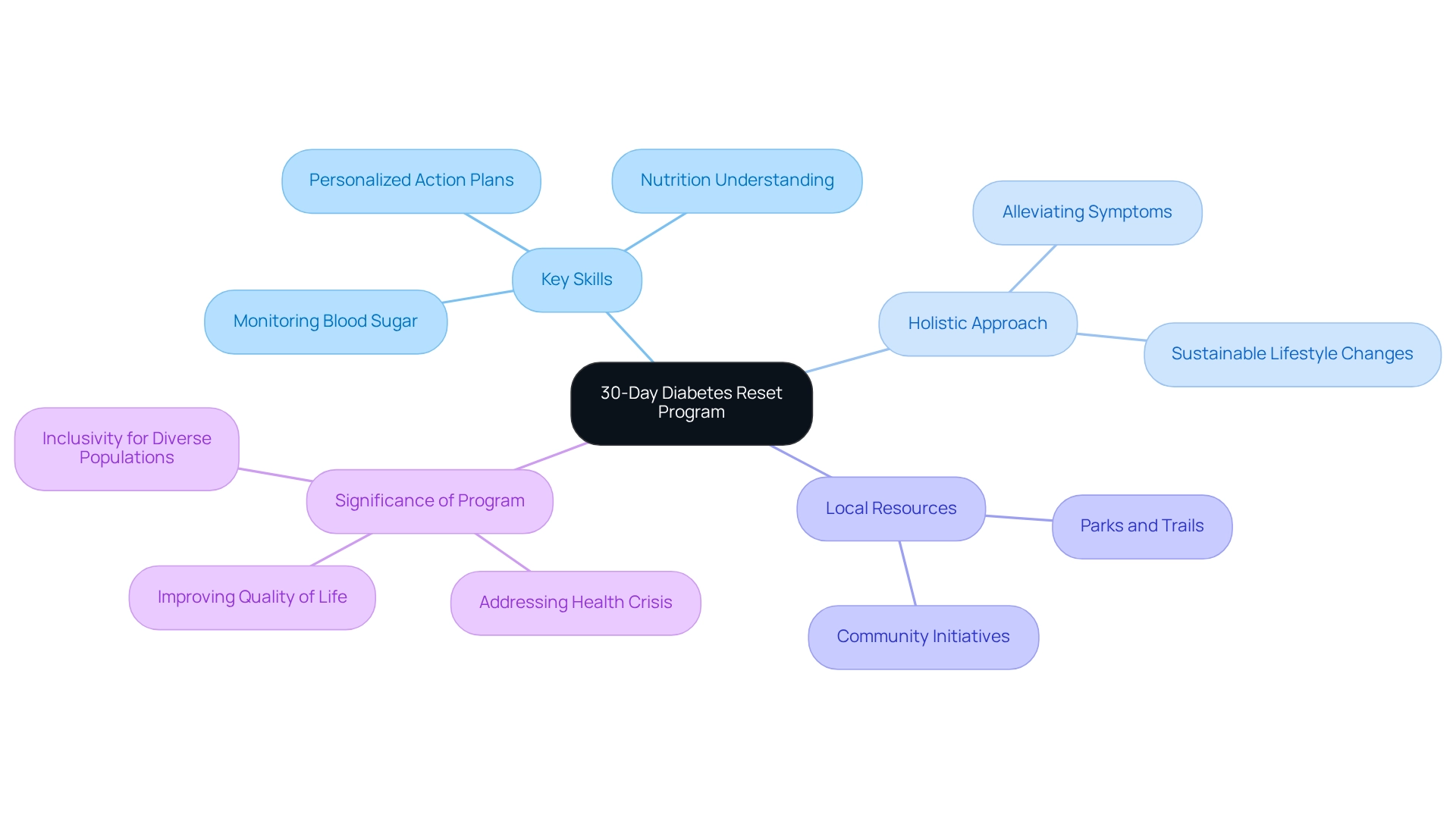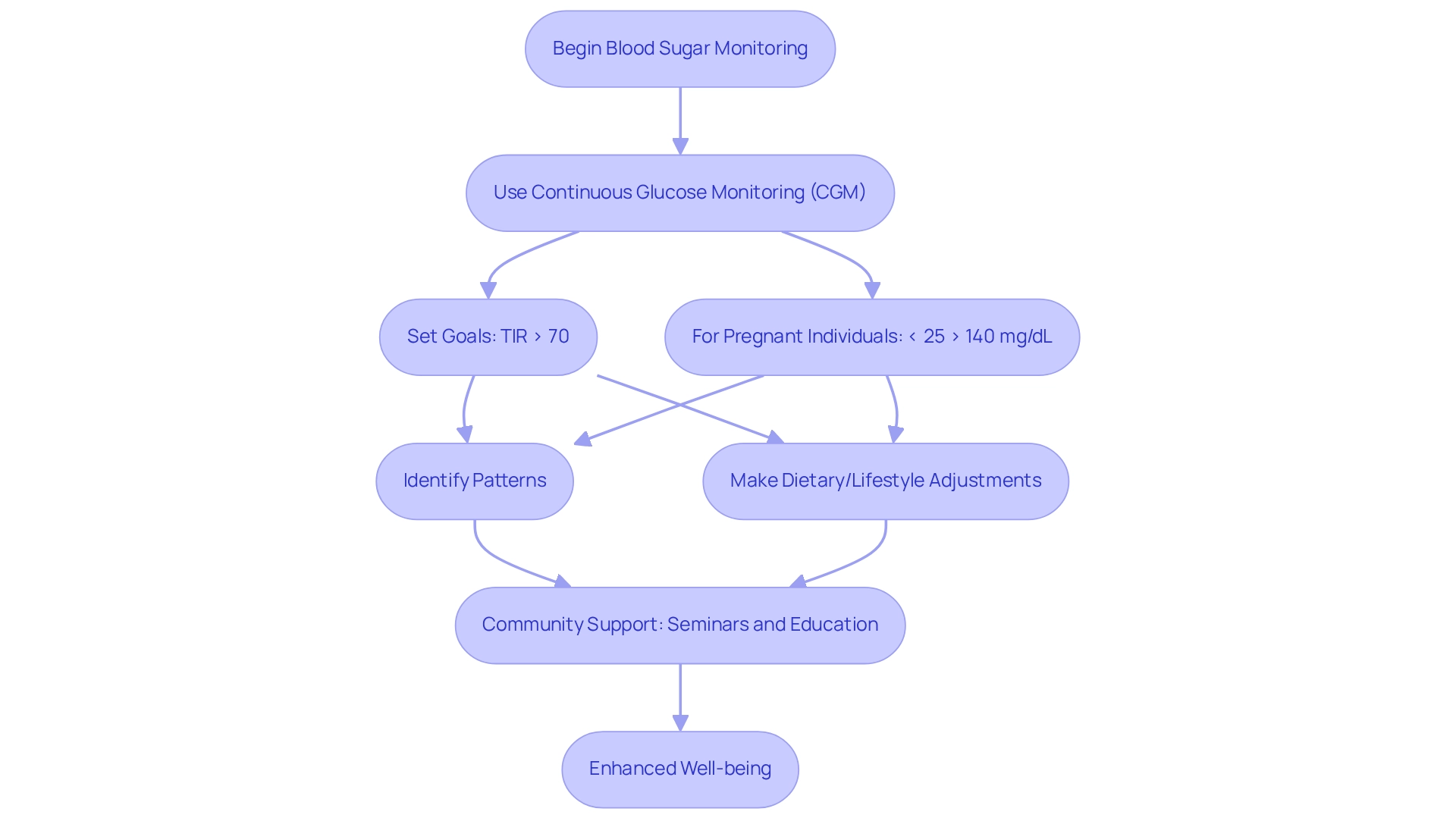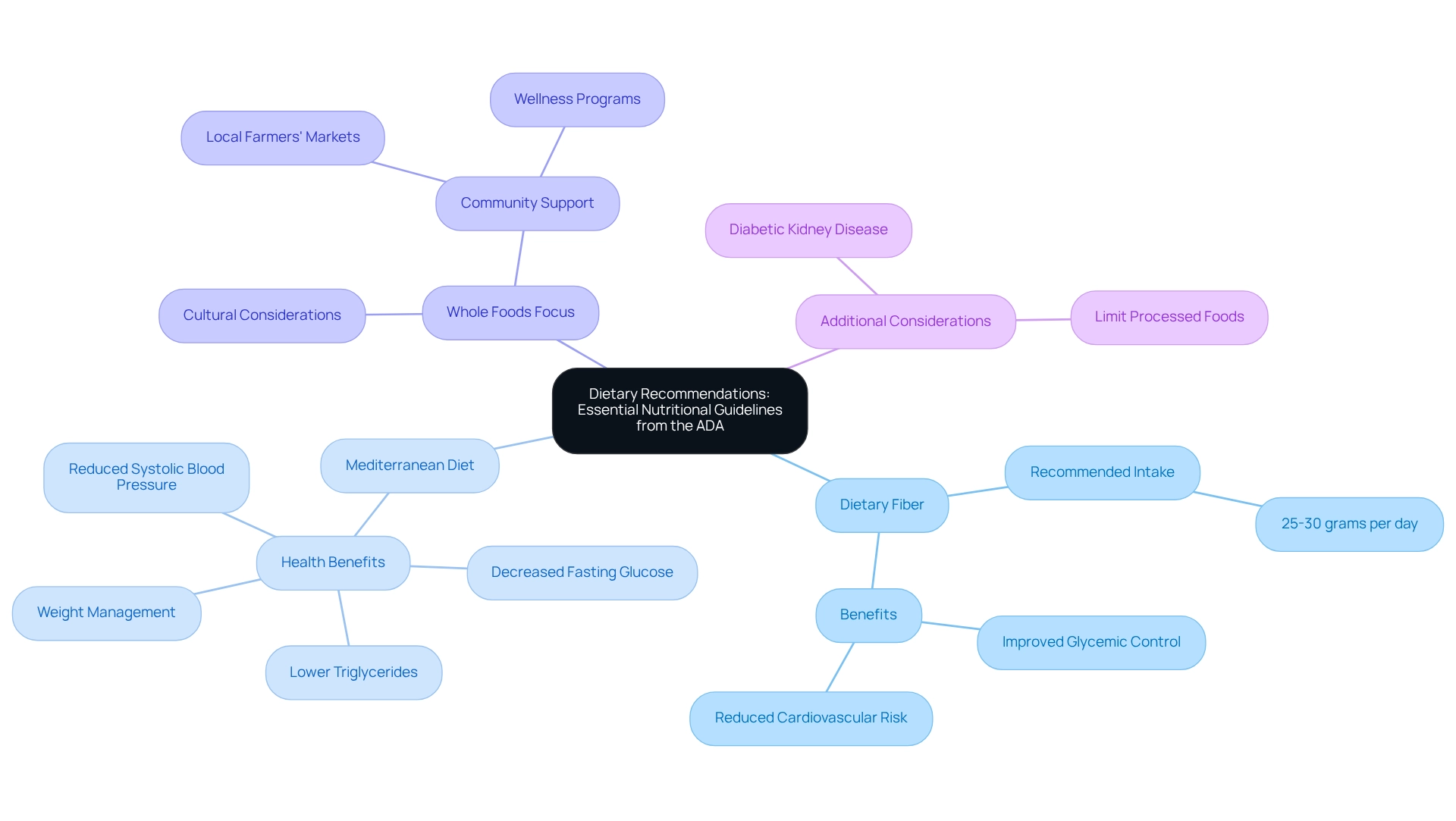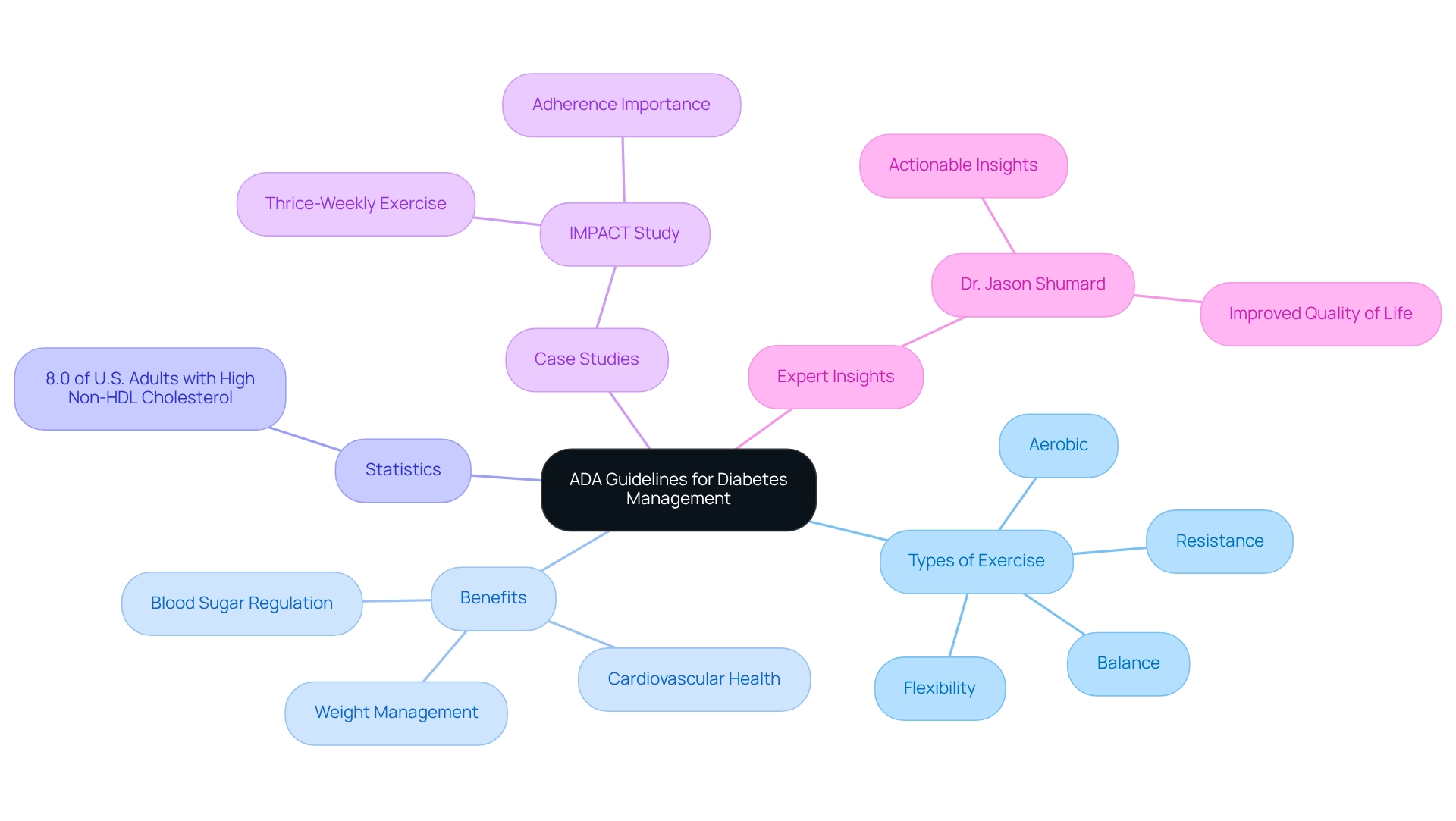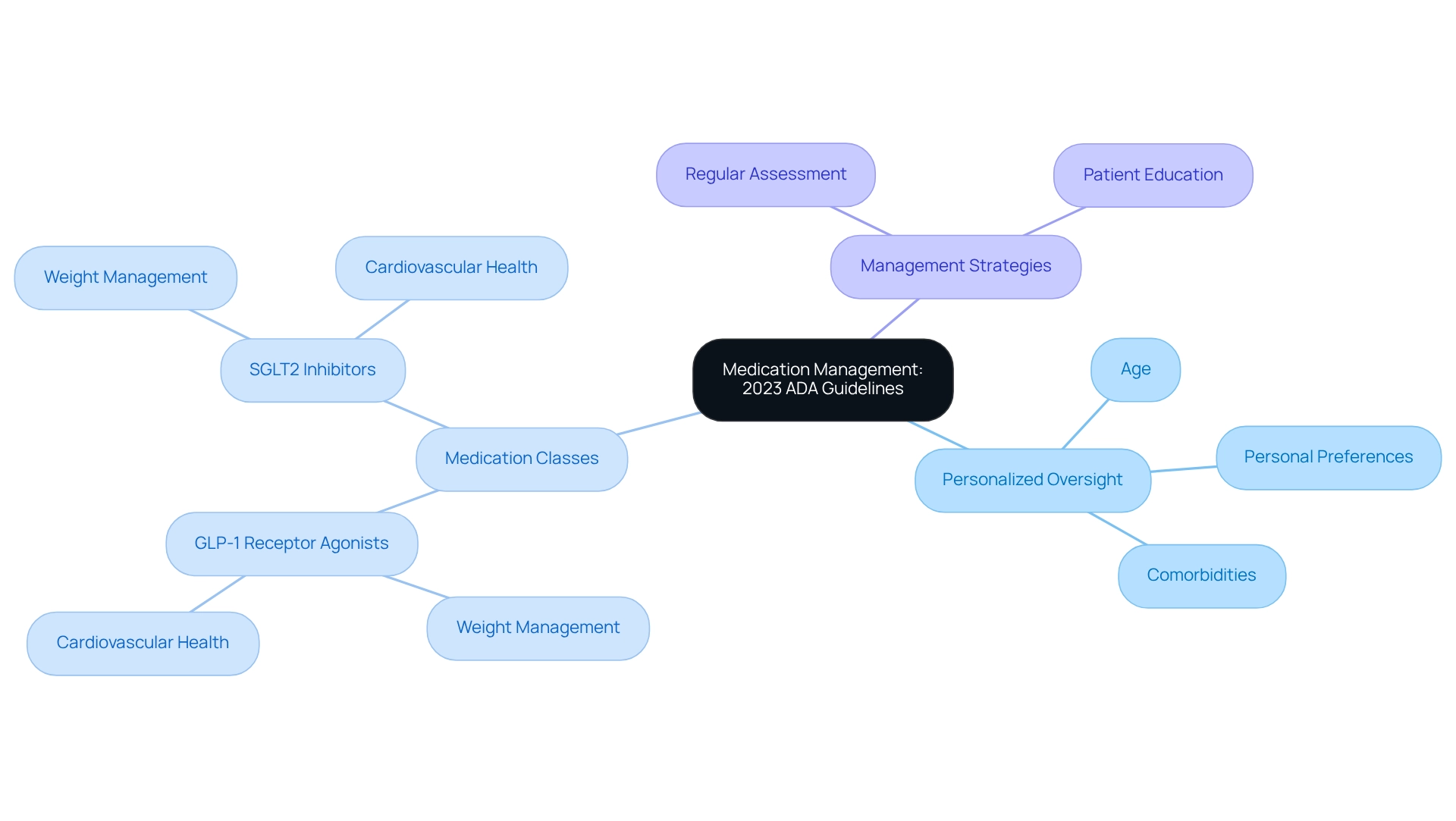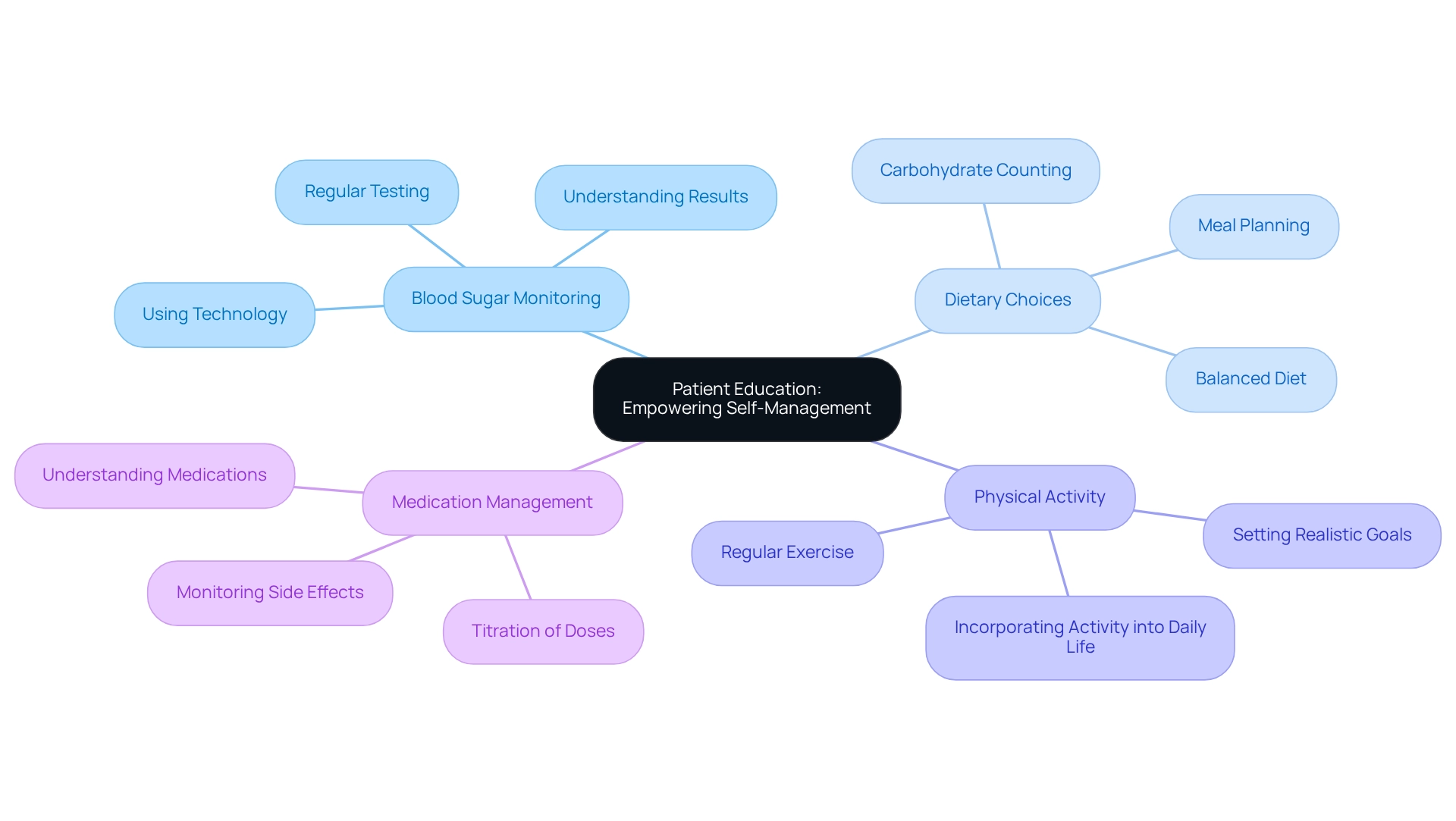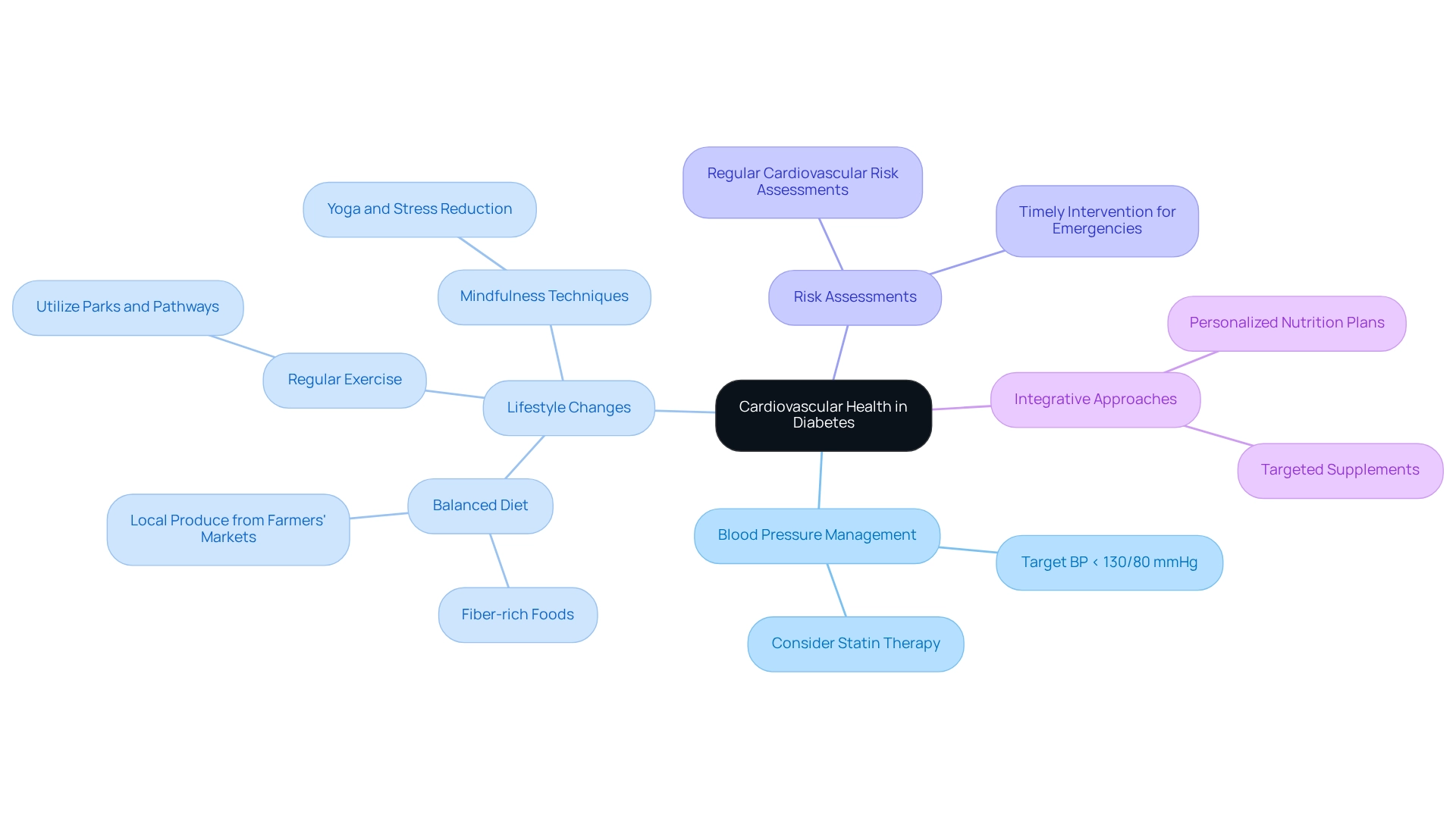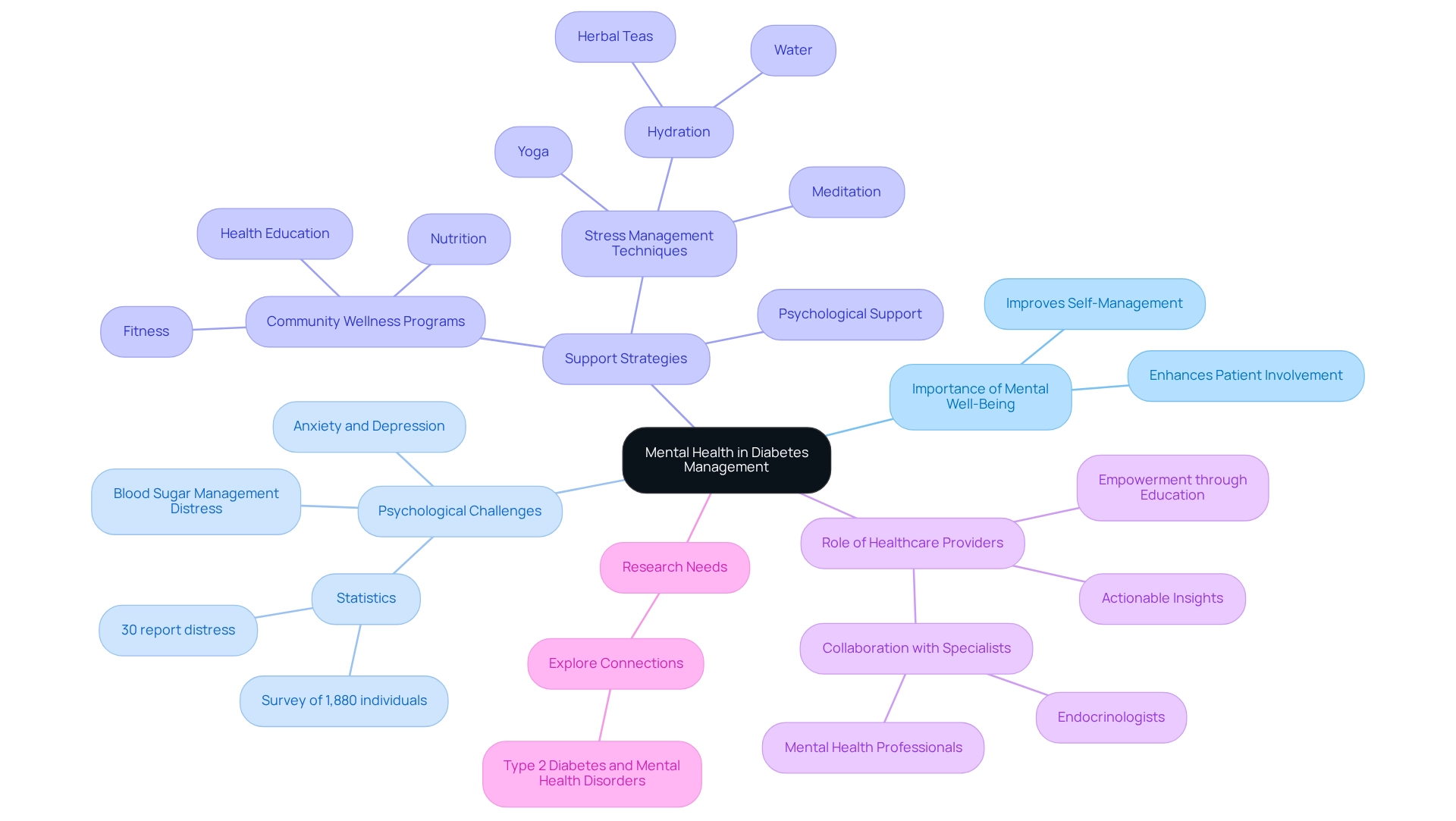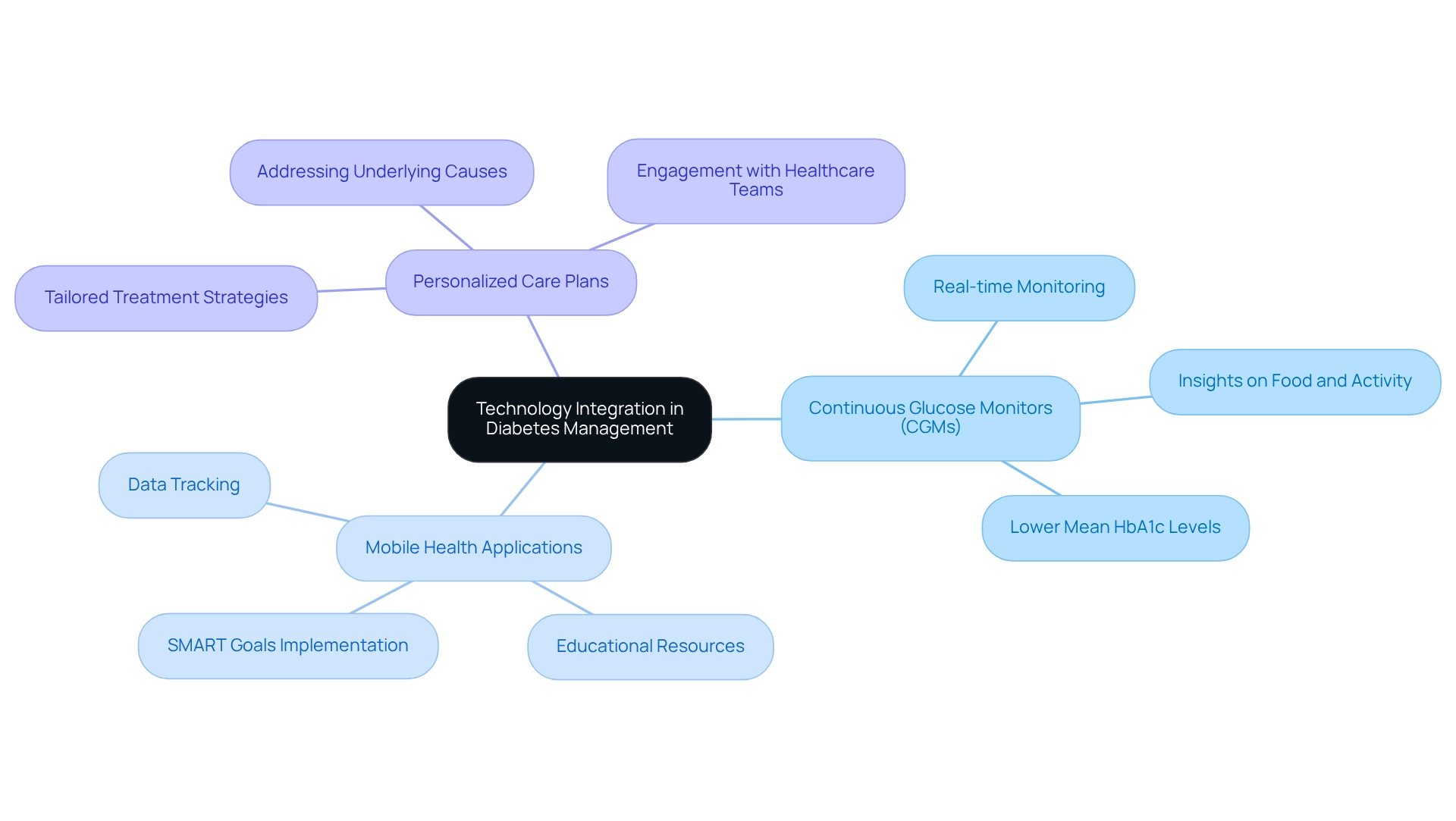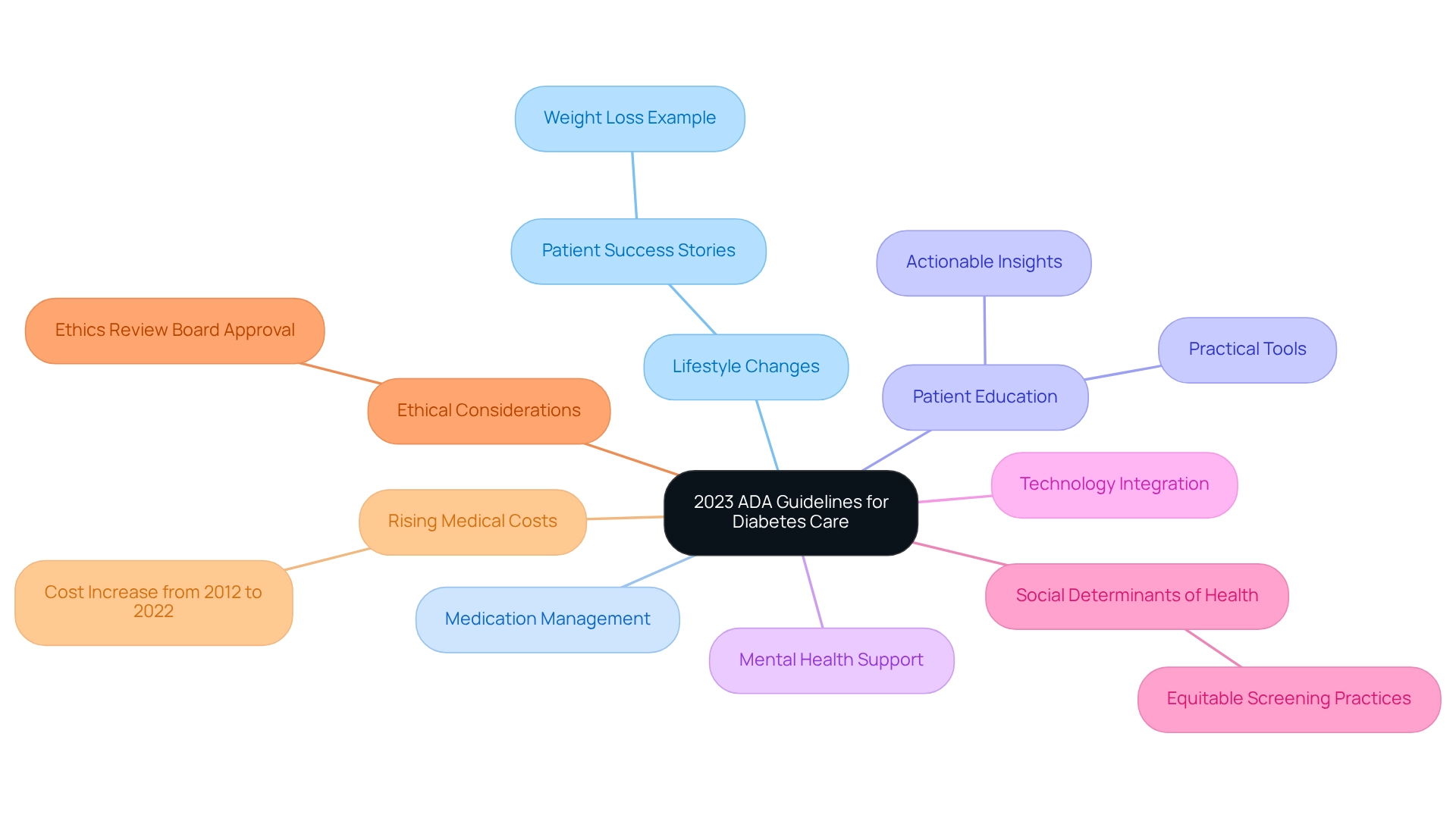Overview
The 2023 ADA guidelines for diabetes management highlight an important, holistic approach that truly understands the challenges individuals face. By focusing on:
- Personalized medication oversight
- Dietary changes
- Physical activity
- Mental health support
- Technology integration
these guidelines aim to empower you in your journey toward better health. It’s important to recognize that managing diabetes can feel overwhelming at times. However, by addressing the interconnected factors that influence your care, these guidelines seek to improve health outcomes and support your self-management efforts.
Many patients find that incorporating these strategies into their daily lives not only enhances their physical well-being but also nurtures their emotional health. With the right tools and support, you can take charge of your diabetes management and work toward a healthier future. Remember, you’re not alone on this journey—there’s a community ready to support you every step of the way.
Introduction
The landscape of diabetes management is evolving rapidly, and it’s important to recognize the profound impact this has on the lives of many. With the 2023 ADA guidelines paving the way for a more integrated and holistic approach, we see a beacon of hope for the over 38 million Americans grappling with this chronic condition. The need for effective strategies has never been more pressing, and these guidelines emphasize personalized care that combines dietary changes, physical activity, medication management, and technological innovations.
Many patients find that empowering themselves in their health journeys can lead to meaningful changes. Programs like the Integrative Wellness Center’s 30-Day Diabetes Reset are at the forefront, offering tailored solutions that not only alleviate symptoms but also foster sustainable lifestyle changes. This comprehensive approach addresses the immediate challenges of diabetes while promoting long-term well-being.
It’s essential for both patients and healthcare providers to stay informed and engaged in this critical dialogue. By understanding the importance of a supportive community and practical resources, we can all work together towards healthier futures.
Integrative Wellness Center: 30-Day Diabetes Reset Program for Effective Management
The Integrative Wellness Center’s 30-Day Diabetes Reset Program is thoughtfully crafted to empower individuals with the essential tools needed for effective diabetes management. This program emphasizes the importance of dietary changes, increased physical activity, and comprehensive education, all aligned with the 2023 ADA guidelines. Participants gain valuable skills in:
- Monitoring their blood sugar levels
- Understanding how nutrition impacts their well-being
- Developing personalized action plans tailored to their unique needs
By embracing a holistic approach, the program not only alleviates symptoms but also inspires individuals to take charge of their wellness journey. This fosters sustainable lifestyle changes that can significantly improve outcomes in managing blood sugar conditions.
For those residing in San Marcos, CA, the area’s beautiful parks and trails provide excellent opportunities for regular exercise, which is vital for enhancing insulin sensitivity and managing weight. The program encourages the inclusion of local produce, such as avocados and berries, in a balanced diet, which is crucial for maintaining healthy blood sugar levels. Additionally, engaging in community wellness initiatives offers further support and resources specifically designed to help manage blood sugar effectively.
With over 38 million Americans affected by this health condition, which is a leading cause of mortality and associated with economic costs of $412.9 billion in 2022, programs like these are essential in addressing the growing health crisis and improving the quality of life for those impacted. The high number of diagnosed and undiagnosed cases, especially among seniors and diverse racial/ethnic groups, underscores the need for inclusive programs that cater to various populations. As Nuha ElSayed, MD, insightfully noted, ‘The area of blood sugar management is evolving rapidly.’ The ADA is committed to providing current guidance based on the best available evidence, reinforcing the importance of the 30-Day Reset Program in staying aligned with the 2023 ADA guidelines and evolving practices in blood sugar care.
Blood Sugar Monitoring: Key Updates from the 2023 ADA Guidelines
The vital role of continuous glucose monitoring (CGM) in effectively managing blood sugar levels is highlighted by the 2023 ADA guidelines. It’s essential for individuals facing high blood sugar to aim for a time in range (TIR) exceeding 70%. This goal is crucial for maintaining stable blood sugar levels. For pregnant individuals with Type 1 sugar intolerance, it becomes particularly important to ensure that less than 25% of their time is above 140 mg/dL. This underscores the need for careful monitoring to help reduce the risk of complications. Achieving these goals empowers individuals to make informed dietary and lifestyle choices. Regular monitoring through CGM allows for the identification of blood sugar patterns, enabling timely adjustments to treatment plans.
At Integrative Wellness Center, we believe in the integration of advanced technology in diabetes care, as highlighted by the 2023 ADA guidelines. Devices that provide real-time feedback are encouraged, enhancing self-management capabilities. Many individuals using CGM technology have shared their experiences of significant improvements in sustaining their TIR, leading to enhanced overall well-being. Our community engagement initiatives, such as seminars and educational events, play a crucial role in supporting individuals. These initiatives create a nurturing environment where patients can learn and share experiences, contributing positively to their health journeys.
Specialists emphasize that regular monitoring is essential for improving the management of diabetes. The 2023 ADA guidelines also stress the importance of insulin schedules that include both basal and correction components for hospitalized individuals with Type 1 diabetes, ensuring comprehensive care. By focusing on individual education and the use of CGM, the guidelines aim to foster a supportive atmosphere where people can take control of their health. As Dr. Jason Shumard beautifully states, “By offering individuals actionable insights and practical tools, the center cultivates an atmosphere where people can regain their health and well-being,” ultimately leading to an enhanced quality of life.
Dietary Recommendations: Essential Nutritional Guidelines from the ADA
The 2023 ADA guidelines emphasize the importance of a balanced diet rich in whole foods, including vegetables, fruits, whole grains, and lean proteins. For patients in San Marcos, CA, local farmers’ markets offer an excellent opportunity to access fresh, seasonal produce like avocados and berries, which are perfect for a diabetes-friendly diet. It’s important to minimize the intake of processed foods high in sugars and unhealthy fats. Individualized meal planning is encouraged, considering personal preferences and cultural backgrounds to enhance adherence and satisfaction.
Key Recommendations:
- Dietary Fiber: The guidelines highlight the importance of dietary fiber, recommending at least 14 grams of fiber per 1,000 calories consumed. Maintaining a daily fiber intake of approximately 25-30 grams can significantly benefit those with type 2 conditions, leading to better glycemic control and a reduced risk of cardiovascular diseases. Many patients find that incorporating fiber-rich foods available at local markets supports these goals.
- Mediterranean Diet: This diet has shown significant decreases in fasting glucose, triglycerides, body weight, and systolic blood pressure, emphasizing the importance of dietary interventions in managing blood sugar. The Mediterranean diet aligns with the 2023 ADA guidelines, focusing on a balanced diet rich in whole foods, making it a suitable choice for residents of San Marcos who can easily access fresh ingredients.
- Whole Foods Focus: The guidelines promote a comprehensive approach to nutrition, emphasizing the importance of whole foods and fiber in achieving optimal wellness for individuals with blood sugar concerns. Engaging in community wellness programs can further support individuals in making informed dietary choices and integrating healthy habits into their lifestyles.
Alongside dietary suggestions, incorporating routine outdoor activities is crucial for managing type 2 conditions. Residents of San Marcos can enjoy hiking at Lake San Marcos or walking the scenic trails at Discovery Lake, which not only provide physical exercise but also enhance mental well-being. Moreover, stress reduction methods like yoga and meditation, offered by local studios and community centers, can greatly aid in improving blood sugar regulation and overall well-being.
Contrasting Perspectives:
- Dr. Tatiana Palotta Minari, a PhD student in Health Sciences, notes that “the benefits of multivitamins or mineral supplements on glycemia and cardiovascular disease risk in T2DM have little literary support, and routine use is not recommended for people who are not deficient.” This underscores the emphasis on whole foods over supplements in managing blood sugar levels.
Additional Considerations:
- Diabetic Kidney Disease: The role of dietary interventions in managing diabetic kidney disease is recognized across various guidelines, underscoring the broader implications of dietary choices for diabetes patients.
Overall, these guidelines support a thorough approach to nutrition, highlighting the significance of whole foods and fiber in effectively managing blood sugar levels. By embracing local resources and community support, individuals can enhance their dietary practices and overall well-being. For personalized guidance and support tailored to your unique needs, consider reaching out to Dr. Jason Shumard in San Marcos, CA.
Physical Activity: ADA Guidelines on Exercise for Diabetes Management
The 2023 ADA guidelines highlight the importance for adults with high blood sugar to aim for a minimum of 150 minutes of moderate-intensity aerobic activity weekly, along with resistance training on two or more days. This dual approach not only aids in blood sugar regulation but also enhances cardiovascular health and supports weight management. It’s crucial to engage in activities you enjoy, as this fosters adherence and helps make physical activity a sustainable part of your daily routine. Moreover, the guidelines highlight the significance of flexibility and balance workouts, especially for seniors, to reduce fall risk and improve mobility.
Real-world examples illustrate the positive impact of organized exercise on blood sugar management. The IMPACT study revealed that participants who committed to thrice-weekly structured exercise sessions and adhered to at least 50% of the program saw notable reductions in HbA1c levels. Although the intention-to-treat analysis showed no significant difference in HbA1c levels, the focus on adherence is essential for effectively managing the condition. This underscores that organized exercise is most beneficial when paired with dietary recommendations. In line with the 2023 ADA guidelines, individuals with this condition are encouraged to incorporate various forms of physical activity into their routines. This includes not only aerobic and resistance workouts but also flexibility and balance activities, which are vital for overall well-being.
Statistics reveal that 8.0% of U.S. adults diagnosed with glucose management conditions have non-HDL cholesterol levels of 190 mg/dL or higher. This highlights the need for comprehensive lifestyle interventions, including exercise, as part of a holistic management strategy. Experts advocate for a personalized approach to exercise, recognizing that each person’s preferences and abilities vary. Dr. Jason Shumard from the Integrative Wellness Center emphasizes that by providing individuals with actionable insights and practical tools, the center creates an environment where people can reclaim their wellness and well-being.
To begin, individuals can refer to the walking program PDF for structured steps to enhance their physical activity. By integrating structured exercise into their daily routines, those with blood sugar issues can significantly improve their health outcomes and quality of life, ultimately reducing their reliance on traditional medical treatments. For personalized advice and resources, reach out to Dr. Shumard at the Integrative Wellness Center.
Medication Management: Insights from the 2023 ADA Guidelines
The 2023 ADA guidelines emphasize the crucial role of personalized medication oversight in blood sugar management, promoting plans that address the distinct needs of every individual. It’s essential to consider factors such as age, comorbidities, and personal preferences when selecting the right medications. Among the newer classes of medications for blood sugar control, GLP-1 receptor agonists and SGLT2 inhibitors stand out for their dual benefits in weight management and cardiovascular health. These medications not only help regulate blood sugar levels but also support significant weight loss, which is crucial since obesity can increase the risk of developing type 2 diabetes by at least sixfold.
It’s important to recognize that regular assessment of medication effectiveness and side effects is key to improving treatment outcomes and ensuring adherence. Statistics show that impaired glucose tolerance and impaired fasting glucose are common in middle-income countries, affecting around 628.4 million people. This underscores the urgent need for effective management strategies tailored to diverse populations. Dr. Shumard’s 30-Day Diabetes Reset program exemplifies a holistic approach to personalized wellness solutions, offering care and education that empower individuals to manage their condition effectively. Many patients find that real-world success stories, like C.H.’s transformative journey, illustrate the positive impact of this program, where individuals have experienced significant improvements in wellness, including weight loss and enhanced blood sugar control. By aligning treatment with personal health profiles, the 2023 ADA guidelines aim to elevate the overall quality of care for individuals managing this condition.
Patient Education: Empowering Self-Management According to ADA Guidelines
The 2023 ADA guidelines emphasize the crucial role of diabetes self-management education and support (DSMES) as a cornerstone of diabetes care. Have you ever felt overwhelmed by managing your condition? Participating in educational programs can equip you with the vital knowledge and skills to take charge of your health effectively. These programs should cover essential areas like:
- Blood sugar monitoring
- Dietary choices
- Physical activity
- Medication management
By fostering a nurturing environment and promoting active participation, healthcare providers can significantly enhance patients’ confidence in their ability to manage their condition.
Research shows that organized education programs for blood sugar management can lead to improved health outcomes. For instance, the International Diabetes Federation (IDF) predicts a rise in diabetes-related conditions in urban areas, increasing from 12.1% in 2021 to 13.9% by 2045. This underscores the urgent need for effective educational strategies. Many patients find that combining education with modern medical treatment, such as medication oversight and the use of appropriate technology, is essential. Betul Hatipoglu emphasizes, “We encourage clinicians and agencies to focus on the implementation of education alongside current medical care, including medications, titration of medication doses, and inclusion of appropriate technology.”
Real-life stories illustrate the power of these educational initiatives. Consider Ed, who struggled with type 2 diabetes for years and found traditional therapies lacking. After joining Dr. Jason Shumard’s 30-Day Diabetes Reset program, Ed achieved remarkable results, losing 55 lbs and lowering his A1C from 9.1 to 5.7. His journey, along with others who have transformed their health through holistic approaches, highlights the necessity for comprehensive education and support in managing blood sugar.
Case studies reveal that well-structured self-management programs can lead to lasting behavioral changes, which are vital for long-term health improvements. It’s important to recognize that enhancing study design and methodology, as highlighted in the 2023 ADA guidelines for future research recommendations, is crucial for strengthening evidence regarding the effectiveness of these programs. Regular reinforcement of education is essential to keep individuals engaged and informed about their health. Ultimately, empowering patients through thorough education not only enhances their self-management skills but also results in better overall health outcomes. While education is vital, it must be integrated into a comprehensive care approach to achieve significant improvements in health metrics, such as A1C levels.
Cardiovascular Health: ADA Guidelines for Reducing Risk in Diabetes Patients
The 2023 ADA guidelines emphasize a significant concern for individuals with diabetes regarding the increased risk of cardiovascular disease (CVD). It’s crucial to recognize that proactive strategies can help mitigate this risk. One pivotal recommendation is to aim for a blood pressure target of less than 130/80 mmHg, which is essential for reducing complications related to cardiovascular health. Additionally, managing lipid levels through lifestyle changes and, when needed, medication is emphasized. Regular cardiovascular risk assessments are vital, especially for patients aged 40 and older, who may benefit from considering statin therapy to lower their risk of heart disease.
Integrative functional medicine approaches, like those offered by Dr. Jason Shumard at the Integrative Wellness Center, focus on personalized nutrition plans that incorporate local produce and community resources. Many patients find that adopting a balanced diet rich in fiber from seasonal fruits and vegetables available at San Marcos farmers’ markets can significantly assist in regulating blood sugar and enhancing overall well-being. Furthermore, targeted supplements may play a role in improving metabolic health and supporting cardiovascular function. Consistent physical exercise, encouraged by the region’s beautiful parks and pathways, can improve insulin sensitivity and help with weight control—both essential for managing diabetes-related health.
Recent studies reveal concerning statistics about cardiovascular risk in individuals with blood sugar issues. For example, a 10-year cardiovascular risk study published on October 9, 2023, highlights a strong correlation between diabetes and an increased prevalence of heart disease. Additionally, data from emergency department visits show that 54.9% of diabetes-related cases were treated and released, while 38.4% required hospitalization. These statistics underscore the critical need for timely intervention in managing diabetes-related emergencies, emphasizing the importance of proactive strategies.
Real-world examples illustrate how lifestyle changes can effectively reduce cardiovascular risk. A notable Chinese trial demonstrated significant reductions in cardiovascular events among older patients through intensive blood pressure control, which involved closely monitoring and adjusting treatment to achieve optimal blood pressure levels. This reinforces the importance of individualized care strategies. Cardiologists emphasize that achieving ideal blood pressure control, according to the 2023 ADA guidelines, not only improves diabetes outcomes but also greatly reduces the likelihood of cardiovascular incidents, establishing it as a fundamental aspect of diabetes care.
Furthermore, incorporating stress reduction techniques such as mindfulness and yoga into daily routines can enhance blood sugar control and overall well-being. As Dr. Jason Shumard mentions, “By offering patients actionable insights and practical tools, the center cultivates an atmosphere where individuals can regain their wellness and well-being.” By following these guidelines and adopting a comprehensive strategy for controlling blood sugar, individuals can make significant strides toward protecting their cardiovascular health. For personalized guidance and support tailored to your unique needs, consider reaching out to Dr. Shumard at the Integrative Wellness Center.
Mental Health: ADA Guidelines on Psychological Well-Being for Diabetes Patients
The 2023 ADA guidelines emphasize the importance of mental well-being in managing blood sugar levels. It’s important to recognize that psychological assistance should be a part of care strategies. Many patients find that tackling challenges like blood sugar management distress, anxiety, and depression can significantly improve their self-management efforts. Regular assessments for mental wellness issues are encouraged, along with providing resources for psychological support. By prioritizing these mental health needs, healthcare providers can foster greater patient involvement and adherence to chronic illness care strategies, ultimately leading to better health outcomes.
Statistics reveal that a significant number of individuals with chronic conditions face mental well-being challenges. Surveys show that nearly 30% of patients report feelings of distress related to their condition. This distress can lead to unhealthy coping mechanisms and self-care neglect, underscoring the need for specialized support. A survey involving 1,880 individuals across seven countries further illustrates the prevalence of mental health challenges among those managing blood sugar issues. Case studies indicate that acknowledging distress related to blood sugar management and seeking help from endocrinologists and mental health professionals can empower individuals to take control of their health. The importance of psychological support in improving management outcomes is also stressed by the 2023 ADA guidelines. Specialists advocate for a comprehensive approach that integrates mental health care as a vital component of managing blood sugar conditions. In San Marcos, CA, individuals can benefit from community wellness programs focusing on health education, nutrition, and fitness, providing essential support tailored to their needs. Additionally, managing stress through practices like yoga and meditation, along with staying hydrated by choosing water or herbal teas, are vital strategies for effective condition management. Continuous research is needed to explore the connections between type 2 diabetes and mental wellness disorders, acknowledging the complexity of this relationship.
By offering individuals actionable insights and practical tools, such as personalized guidance from Dr. Jason Shumard, healthcare providers can create an environment that fosters wellness and well-being. Dr. Shumard emphasizes this importance, stating that empowering individuals through education and support is essential for effectively managing blood sugar.
Technology Integration: ADA Guidelines on Using Tech for Diabetes Management
The integration of technology in diabetes management is strongly emphasized by the 2023 ADA guidelines, which recognize the vital role of continuous glucose monitors (CGMs) and mobile health applications. These innovative tools allow for real-time blood glucose monitoring, empowering individuals to track their levels continuously, day and night. With CGMs providing a constant readout every few minutes, self-management becomes more achievable, fostering better communication between individuals and their healthcare providers.
It’s important to recognize that healthcare teams are encouraged to weave these technologies into personalized care plans. This integration significantly boosts client engagement and glycemic control. For instance, a recent study revealed that the use of insulin pumps and CGMs led to lower mean HbA1c levels across various socioeconomic groups. This finding underscores the universal benefits of technology in managing diabetes, regardless of economic status. Many patients find this especially significant, particularly those with type 2 conditions, as it highlights how technology can enhance outcomes across diverse demographics.
Moreover, CGMs provide users with crucial insights into how different foods, exercise, and stress impact their glucose levels. This real-time feedback enables individuals to make informed choices about their health, ultimately leading to better management of their condition. As Dr. Fernando Ovalle, director of UAB’s Multidisciplinary Comprehensive Diabetes Clinic, states, “It’s an eye-opener for people to see what happens to their glucose when they eat this food versus that one, what happens when they exercise or don’t, what happens when they are stressed or not.” Such insights can be transformative, enhancing patients’ understanding and control over their health journey.
Alongside technology, a personalized approach to healthcare is essential. Functional medicine emphasizes the importance of tailoring treatment strategies to individual wellness profiles, considering medical history, lifestyle choices, and genetic factors. This comprehensive approach not only addresses symptoms but also targets underlying causes, leading to more effective management.
The importance of mobile medical applications in managing blood sugar conditions is also highlighted by the 2023 ADA guidelines. These apps facilitate data tracking and offer educational resources and support, further enriching the patient experience. To effectively monitor progress, individuals are encouraged to explore various tracking methods, such as fitness apps and journals, and to implement SMART goals—specific, measurable, attainable, relevant, and time-bound. By embracing technology and personalized strategies, individuals with blood sugar challenges can achieve improved wellness outcomes and a better quality of life, aligning with the ADA’s vision for comprehensive care.
Overall Impact: How the 2023 ADA Guidelines Enhance Diabetes Care
The 2023 ADA guidelines signify a substantial change in care for individuals dealing with blood sugar challenges. They advocate for a comprehensive approach that encompasses lifestyle changes, medication management, and the integration of technology. At the heart of these guidelines is a commitment to patient education and empowerment, which are vital for enhancing self-management skills and improving health outcomes for those living with diabetes.
It’s important to recognize that mental health support and cardiovascular risk management are also integral to these guidelines. This holistic perspective acknowledges the interconnectedness of various factors that contribute to comprehensive care for individuals with diabetes.
Statistics reveal a concerning trend: from 2012 to 2022, the excess medical costs associated with diabetes surged from $10,179 to $12,022 per person. This alarming increase underscores the urgent need for effective management strategies, which the ADA guidelines aim to address by offering a robust framework for healthcare providers. This framework empowers them to deliver personalized support that meets the complex needs of individuals. Many patients find that real-life examples of successful blood sugar management strategies highlight the positive impact of these guidelines. One patient shared, “I lost 55 lbs. My A1C began at 9.1 and after 8 months it is now 5.7,” showcasing the transformative effects of a holistic health management approach.
Expert opinions reinforce the transformative potential of the 2023 ADA guidelines, especially in promoting a more inclusive approach to managing blood sugar conditions that takes into account social determinants of health. This focus is essential, as research indicates no significant differences in the prevalence of undiagnosed blood sugar conditions based on educational attainment, highlighting the need for equitable screening practices. Additionally, ethical considerations in blood sugar screening, as outlined in recent case studies, enhance the integrity of these guidelines, ensuring that ethical standards are upheld in the pursuit of effective care. Another individual noted, “I feel so much better… I lost a lot of weight, have more energy and feel great,” which emphasizes the holistic benefits of the program.
Overall, the 2023 ADA guidelines enhance diabetes care and empower patients to take control of their health through actionable insights and practical tools. This aligns with the center’s mission to provide comprehensive support for managing chronic conditions. The 30-Day Diabetes Reset program exemplifies this approach, offering tailored strategies that address individual needs and foster lasting health improvements. Are you ready to embark on a journey toward better health?
Conclusion
The 2023 ADA guidelines represent a transformative approach to diabetes management, emphasizing a holistic strategy that integrates lifestyle changes, medication management, and technological advancements. It’s important to recognize that by focusing on personalized care, these guidelines empower individuals to take control of their health through education and community support. Programs like the Integrative Wellness Center’s 30-Day Diabetes Reset exemplify this approach, equipping participants with essential tools to manage their diabetes effectively and sustainably.
Key components of the guidelines—dietary recommendations, physical activity, medication management, and mental health support—work synergistically to enhance overall well-being and reduce complications associated with diabetes. Many patients find that the integration of continuous glucose monitoring and mobile health technology further facilitates informed decision-making, enabling them to respond proactively to their health needs.
As the prevalence of diabetes continues to rise, the need for inclusive and comprehensive care strategies becomes increasingly urgent. By fostering a supportive environment that prioritizes education and self-management, healthcare providers can significantly improve health outcomes and quality of life for those affected by this chronic condition. Embracing the principles outlined in the ADA guidelines not only enhances diabetes care but also paves the way for a healthier future for millions of individuals navigating the complexities of diabetes management.
Frequently Asked Questions
What is the 30-Day Diabetes Reset Program at the Integrative Wellness Center?
The 30-Day Diabetes Reset Program is designed to empower individuals with the tools needed for effective diabetes management, focusing on dietary changes, increased physical activity, and comprehensive education aligned with the 2023 ADA guidelines.
What skills do participants gain from the program?
Participants learn to monitor their blood sugar levels, understand the impact of nutrition on their well-being, and develop personalized action plans tailored to their unique needs.
How does the program approach diabetes management?
The program adopts a holistic approach that not only alleviates symptoms but also encourages individuals to take charge of their wellness journey, leading to sustainable lifestyle changes that improve blood sugar management.
What local resources are available for participants in San Marcos, CA?
Residents of San Marcos can utilize local parks and trails for exercise, access fresh produce from farmers’ markets, and engage in community wellness initiatives to support blood sugar management.
Why is continuous glucose monitoring (CGM) important in diabetes management?
CGM is crucial for managing blood sugar levels effectively, as it helps individuals maintain a time in range (TIR) exceeding 70%, allowing for timely dietary and lifestyle adjustments.
What dietary recommendations are emphasized by the 2023 ADA guidelines?
The guidelines recommend a balanced diet rich in whole foods, including vegetables, fruits, whole grains, and lean proteins, while minimizing processed foods high in sugars and unhealthy fats.
What is the recommended fiber intake for individuals with type 2 diabetes?
It is recommended to maintain a daily fiber intake of approximately 25-30 grams, with at least 14 grams of fiber per 1,000 calories consumed, to improve glycemic control and reduce cardiovascular disease risk.
How does the Mediterranean diet relate to diabetes management?
The Mediterranean diet, which emphasizes whole foods, has shown significant benefits in reducing fasting glucose and other health metrics, making it a suitable dietary choice for managing blood sugar.
What outdoor activities are suggested for managing type 2 diabetes in San Marcos?
Activities such as hiking at Lake San Marcos or walking the trails at Discovery Lake are encouraged, as they provide physical exercise and enhance mental well-being.
Are multivitamins or mineral supplements recommended for diabetes management?
Routine use of multivitamins or mineral supplements is not recommended for individuals who are not deficient, emphasizing the importance of whole foods over supplements in managing blood sugar levels.
